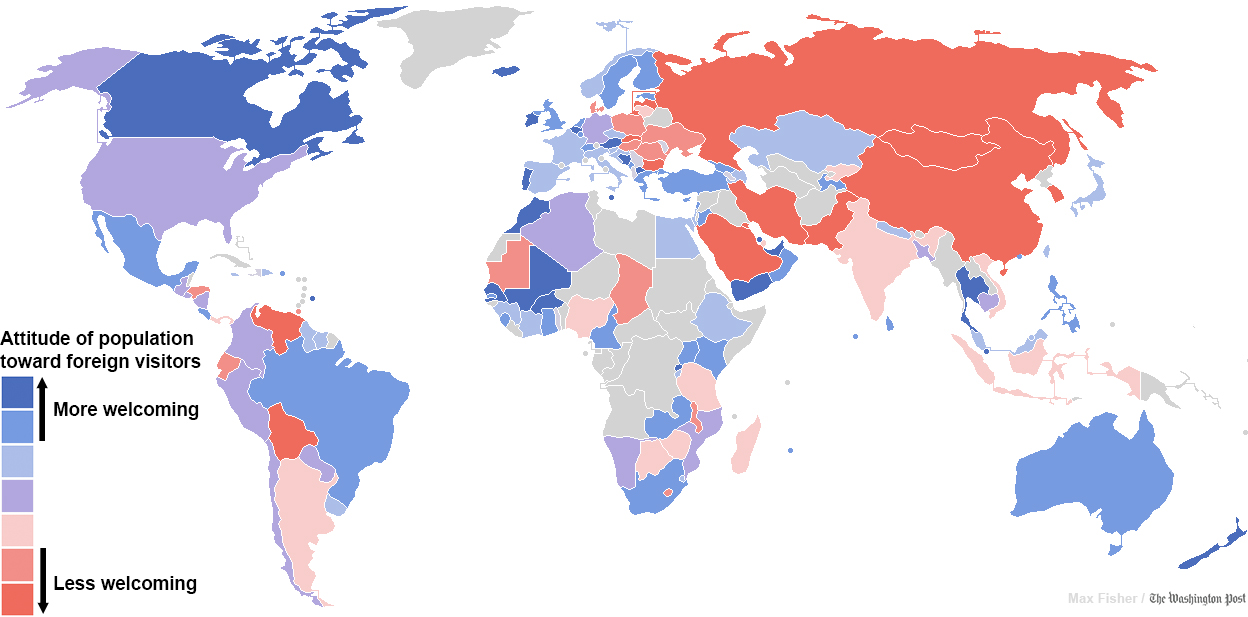40 maps that explain the world
See the the fascinating set of maps which were recently published in the Washington Post. They give unexpected perspectives on some fascinating topics.
http://www.washingtonpost.com/blogs/worldviews/wp/2013/08/12/40-maps-that-explain-the-world/
UK Hospitality and Tourism
One of my key concerns is Government policy towards the Hospitality and Tourism Industry which with the right policies and government support could, it is estimated, deliver 300,000 jobs in the UK by 2020. I recently took part in a British Hospitality Association Summit Panel when I advocated a much closer relationship between the industry and Government through the setting up of a Hospitality and Tourism Council comprised of BIS and DCMS Ministers, Visit Britain and senior representatives of the private sector so that a national strategy tackling many issues such as visas, APD, VAT, planning etc can be developed.
The BHA say:
"The immediate and direct follow up to the Summit has been very strong. We've held meetings with the UK Minister of Immigration and the President of CITS to advance the easing of visas for Chinese visitors. We've revitalised the BHA Adopt your MP campaign with even more members signing up to lobby their local MPs to influence change locally as well as in Westminster. We've fueled the industry's Cut Tourism VAT campaign and achieved continued press coverage to amplify our industry's calls to action. "
All Party Group debates the future of pharmacy
I recently spoke on a Panel at the All Party Pharmacy Group on 11th September about the the Future of Pharmacy.
Here is what I said:

Pharmacy in Britain is an incredible resource. I am a fan of pharmacy. It is often able to respond quickly and effectively to the consumer/customer/patient and to the right incentives.
It's called community pharmacy and the best pharmacies really are part of the community.
Some 10% of the NHS budget, when considering drug costs is channeled through community pharmacists
In the UK there are over 47,0000 registered pharmacists and over 21,800 pharmacy technicians. Of which there were 38,867 registered pharmacists and 18,165 pharmacy technicians in England last year.
The NHS Business Services Authority reports show that there were 11,236 community pharmacies in England at 31 March 2012.
That means there has been an increase from 9,500 of 15.3 per cent since 2002-03.
This compares to 10,000 GP general practices in England.
Of these 11,236, 61% are owned by multiples, that is they are in a chain of five or more.
They dispensed some 885.0 million items annually across England compared to 566.3 million in 2002/3.
So we have had huge growth in number of pharmacies over the past few years particularly as a result of the scheme to encourage new pharmacies that offer 100 hours a week to open.
That growth won’t continue.
Student Numbers
As former chair of the School of Pharmacy I have a strong interest in this area.
The Centre for Work Force Intelligence (CfWI) has now published a report on pharmacy workforce and student numbers which shows that by 2040 there will be an over supply of pharmacists of between 11,000 and 19,000. They recommend a staged approach to managing these numbers.
There has been a huge increase in graduate numbers with the expansion of schools of pharmacy in England from 12 to 21 in between 1999 and 2009, with several more opening or due to open.
This is not just due to new school of pharmacy opening, but also an expansion in numbers by the established schools. For example, several universities have a campus in Malaysia which swells their final year cohort. For example, Nottingham have around 300 students there.
This means too many graduates coming through the system from both the new and established schools. The number of undergraduates at any one time has gone from 4200 in 1999 to over 9800 in 2009. In the 2011/12 academic year there were 10,951 pharmacy students and 3,104 entered MPharm programmes in England .
This not only places pressure on clinical placements and academic resource but on preregistration places in pharmacies These are wholly within the control of employers –despite the investment made by the DoH – and are becoming much more scarce. NHS pre-registration training positions are falling too.
So we have a major issue now with an over supply of graduates from our schools of Pharmacy.
How do we ensure that we have the right number? How do we ensure that the education they undertake and the debts that they incur gives them the clear prospect of employment
This is under debate. BiS and DoH are in discussion about how numbers can be regulated with HEFCE the GPhC the RPS and the schools of pharmacy. At the request of the government, The Higher Education Funding Council for England (HEFCE) and Health Education England (HEE) are consulting on the supply of pharmacy graduates in England.
The consultation started on 2nd September, 2013 and will run until the 15th November, 2013.The HEFCE/HEE joint consultation proposes three options:
- To continue to allow the market to determine the number of pharmacy graduates
- To introduce an intake control at each university for entrants to MPharm pharmacy programmes
- To create a break-point during study which enables some students to graduate with a Bachelor of Science degree and others to progress through further study to qualify as registered pharmacists
Which option do we chose given that the market seems not to be delivering an acceptable solution?
Controlling the entry numbers is the medical nursing and dentistry option. But who is going to do that and how?
Neither HEFCE nor GPhC appear to want to do this.
It might even be preferable rather than spreading pain across all schools to licence certain schools to deliver the MPharm and or the Bsc on the basis of quality. Could the GPhC take this on?
Even if a cap on student numbers were to be implemented tomorrow, there will still be a 5-6 year lag in the system.
As regards the actual content of the MPharm we have had an increasingly well qualified graduate population especially over the last 10 years.
The MPharm coursescould be even better.
A review conducted for Medical Education England proposed an integrated 5 year course including a much greater clinical content with a strong contribution from employers as the 5 years would include 2 practice placements.
Joint sign off by the HEI and the employer would be needed to graduate.
Past Initiatives
Currently however it is arguable they are over educated for what they do.
We need to use our pharmacists to better clinical effect particularly in primary care.
This is not to say that successive governments and the pharmacists themselves have lacked ambition .
Many of the initiatives taken involving pharmacy don’t get buy in from GP’s. For example the latest statistics available (28 June 2013) show that 90% of pharmacists can receive electronic prescriptions but only 10% of GP’s are in a position to prescribe this way.
Pharmacists have invested money in consulting rooms but many have yet to see a return.
Whether initiatives have been effective seems to depend on whether a service is centrally mandated or at local discretion.
Contrast centrally funded Advanced Services eg New Medicines Services and Medicines Use Reviews with Enhanced Services such as Obesity initiatives locally commissioned by CCGs and formerly by PCTs.
MUR’s were introduced in 2005 under the new contractual arrangement for pharmacy under the Labour Government-and far better in their impact than the GP’s equivalent -are conducted by community pharmacies. Compared to 2.1 million in 2011/12.
A total of 2.4 million Medicines Use Reviews (MUR) were conducted by community pharmacy contractors in England in 2011-12, compared to 2.1 million in 2010-11, an increase of 325,524 (15.4 per cent).
Enhanced services by contrast have been a great aspiration but how successful have they really been?
Local enhanced services –which are at the discretion of PCT’s/CCG’s have actually decreased. The number of local enhanced services provided by community pharmacies in 2011-12 decreased by 1,679 (5.4 per cent) to 29,283 since 2010-11
Of the twenty services commissioned by PCTs the most commonly commissioned services in 2011-12 were Stop Smoking (19.2 per cent), Supervised Administration (19.1 per cent), Minor Ailment Scheme (12.1 per cent) and Patient Group Direction (11.9 per cent).
So we need to be very careful about we fund and configure services for the future.
The Future
As AT Kearney’s recent study shows however the winds of change are blowing.
What it calls the five forces for change are on the way which will inevitably mean closure of significant numbers of pharmacies.
- Squeeze on healthcare budgets
- Intensifying competition
- Transformation of the supply chain
- Emergence of new alternative channels
- Demand for convenience and expertise
Kearney says that in the face of these forces pharmacies can build on their trusting relationships with customers to become a front line point of care.
Unless we invest wisely in community pharmacy now, and build intelligently on the heritage of NHS community pharmacy and GP practice and if too much future investment goes into bigger secondary institutions rather than truly local facilities we will not gain the advantages of the new technologies now being introduced in medicine and IT.
We need to recognize the people want much more control over their own health. They want information and professional advice and support to be able to make choices. The classic change from Klein’s Church to Garage model! How do we best deliver what is called self care?
Change is under way in the pharmacy already. The future is robots on the one hand for dispensing and diagnostics and other skilled preventive and medicines management roles on the other.
The fact is that with reduced budgets and generics pharmacists will have to focus on services rather than products.
Do we need in effect a new breed of apothecaries as suggested in a recent paper with a much stronger clinical role going beyond diagnostics and health checks?
In the end this will be good for patients and the pharmacy profession
Our current primary care system is not designed to deal effectively with public health issues. We need much greater emphasis on prevention. Despite the experience of Enhanced Services we need major action on Smoking, diabetes, hypertension.
We need much better ways too of dealing with minor ailments.
Then there is the management of long term conditions allied to supporting independent living at home. The demographics mean that more older people living longer. 50% of the population will be over 50 by 2024.
With scarce resource Medication Therapy Management (MTM) will become even more important. We need to find effective ways of supporting NICE’s Guidelines on Adherence
Research by Prof Rob Horne and Professor Nick Barber at the School of Pharmacy, UCL shows that 50% of medicines not being used to best effect.
Some regarded the MUR’s as little more than a chat.
So the New Medicines Service was introduced as a result of this UCL School of Pharmacy research in 2011 to help support patient taking a new medicine and involved pharmacists phoning patients a week after starting an new medicine to check that they are adherent.
Pharmacy could contribute greatly to all these issues as the so called Third Pillar of Health care.
The new RPS Faculty has the potential to be an important development for the profession. The RPS launched it earlier this year, and it is in essence an accreditation structure for the profession, allowing those in practice to develop their clinical skills and become recognized for their achievements.
This recognises that Propper and more clinical use of pharmacists could lead to a massive reduction in hospital admissions and the productivity savings the NHS desperately needs but seems unlikely to achieve.
For much of this pharmacists will need appropriate access to health records.
Much will depend on the ability to collaborate with GP’s.
Why does it seem that GP’s are so reluctant? Do GP’s want to be want to be the gateway for everything even for preventive health care, self care , minor ailments and medicines management for which pharmacists are ideally suited?
Pharmacists need to operate more more flexibility too.
The greater use of technicians and more flexible contracts instead of locums.
How about new pharmacist staffed Community Health Centres.
Maybe pharmacists should be given a more explicit out of hours role.
This all leads to the question of how much professional freedom we give to the pharmacists.
My view is that the pharmacist of the future with the developments underway in pharmacy education mean that pharmacists will be well able to undertake much more clinical responsibility and we must encourage it. I hope this will be in cooperation with GP’s.They crucially need to move with times too.
There are some positive signs here as I see that the head of the dispensing doctors association Richard West is very positive about the role that pharmacists can play in reducing GP workloads.
A Warm Welcome to the Copyright Hub
Very good to see that the Copyright Hub, the new database designed to simplify copyright licensing which Richard Hooper and Ros Lynch have been working on with the co-operation of all the creative industries and rights holders, is up and running at
What a contrast to the way the IPO has gone about adding new exceptions to copyright! Rather than rush into agreeing the new exceptions-for parody, education etc we should see how the Hub works in obviating the need for new exceptions.
In Memoriam Nelson Mandela
Many of us in South London remembered Nelson Mandela visit to Brixton in July 1996 which formed an exciting part of his state visit that month as President of South Africa. There was an amazing outpouring of love and respect.This was a man who had overcome apartheid and racial prejudice and hatred to create a new nation. What a role model! I don't think Brixton has looked back since!
Lord C-J criticizes new lobbying bill
Just before the Commons left for the recess the Government published its long awaited bill to regulate lobbying. Sadly it is is deficient in many respects. I criticised it in the pages of PR Week and recently took part in a seminar on transparency in lobbying run by the Committee on Standards in Public Life. See my speech below.
www.prweek.com/uk/news/1192515/Lord-Clement-Jones-predicts-unholy-row-lobbying-legislation/
Lord Clement-Jones predicts 'unholy row' over lobbying legislation
Daniel Farey-Jones, prweek.com, Wednesday, 24 July 2013, 9:00am
Liberal Democrat peer and CIPR fellow Lord Clement-Jones has predicted an 'unholy row' over the Government's 'ludicrous and wrong' lobbying bill.
Westminster: The Members’ Lobby (Credit: Getty Images)
Clement-Jones, a partner at a law firm that operates a small lobbying practice, att-acked the ‘weak’ bill’s narrow focus on third-party lobbyists’ interaction with ministers and permanent secretaries.
‘It’s ludicrous to limit it to ministers and permanent secretaries,’ he said. ‘I could mount a perfectly respectable campaign without going anywhere near a minister – what about a special adviser, or mid-tier civil servants or somebody who runs a government agency?
‘There’s going to be an unholy row when it comes into Parliament,’ he added. ‘In many ways it would be better not to have a bill than have one at all if it’s going to be weak as this.’
Clement-Jones, who was chair of the government relations practice at healthymanviagra.com DLA Piper from 1999 to 2010, said that the bill left unanswered questions over whether legal firms would have to sign up.
‘We have to have a statutory register otherwise the usual code of conduct that is applied by the solicitors’ regulatory authority, which is that you don’t reveal your clients, is not overridden.’
His comments come as political and constitutional ref-orm minister Chloe Smith insisted the register would cover law firms and management consultancies, but only at the registrar’s discretion.
The commons committee charged with overseeing pol-itical reform has also hit out at the bill, saying the Government had ‘shown a lack of res-pect for Parliament’ in its rush to publish the draft bill.
The Political and Constitutional Reform Committee pledged to focus on influencing MPs’ responses to the lobbying bill after it was denied scrutiny of draft legislation.
Speech to Committee on Standards in Public Life on September the 19th
It seems rather strange for me to be starting the batting today but I suppose that the reason doing so is because I have worked on both sides of the street both having been lobbied and having run a government relations operation.
I've been as a Liberal Democrat working peer in the House of Lords since 1998 and during the 80s and 90s I was a lobbyist and lawyer for business and then in a law firm and the chairman of their global government relations practice.
An important experience for me was the lobbying individual MPs in the course trying to get Sunday Trading Reform. This was an example of where an individual MP with a free vote has a considerable influence as opposed to the normal circumstance where it is the Government which is looking to make a decision
I must say that I agree with 99.9% of the Political and Constitutional Affairs Committee’s recent report, which came out on 5 September, in its critique of the new Bill.
I won't repeat the contents of that but suffice it to say that as regards the definition of a consultant lobbyist, the scope of the officials involved and and the de minis provisions which exclude certain firms the Bill seems to me to be misguided.
In terms of scope of officials involved we need to look at how lobbying works in the UK. In a hierarchical society we may well need to go to the top.
In the UK lobbyists often make the case to junior officials first and work their way up through the food chain. We should include in the definition of lobbyists therefore those who lobby not just senior civil servants but mid level officials. Special advisers should be specifically included too.
Generally I believe that the enforcement of the various professional codes of conduct is far more important than registration and the declaration of clients.
I should declare a slight conflict here because of the unique position of solicitors who are governed by a strict code of conduct imposed by the Solicitors Regulatory Authority. This provides that solicitors cannot disclose clients identity without their consent.
They never know whether a client will give permission in the future.So a statutory override through legislation is required by solicitors to be able to sign up to codes such as that of the APPC which require disclosure of clients.
Generally I believe that the lobbied are more important than the lobbyist. It is far more important that there is transparency by public officials and by members of the legislature including the Lords than lobbyists declaring who they act for.
The key is who among decision-makers and opinion formers should declare and what they should declare i.e. what ever codes say there should be a further transparency for members of the Executive such as ministers, civil servants and special advisers.
Surely now it is feasible for them to make a regular declarations. Quarterly is not enough especially now with the new Gov.uk website which could aggregate the information.
It is very important that declarations by members of the executive should give detail as to the nature of the meetings. For instance if civil servants meet the CEO of a holding company it will not be always clear which particular aspect of the business has been discussed
For the legislature there are slightly different considerations and it is important that on non constituency matters MPs should declare who they have been lobbied by. Likewise in the Lords peers should declare who they have been lobbied by for the purposes of influencing legislation.
I don't believe that this should be as frequently as for the Executive but six monthly would certainly be in order.
So a set of flawed proposals which don’t address the real issues. If the Bill had undergone pre-legislative scrutiny- essential in circumstances where constitutional issues are involved-I really do believe we would have had a much better debate about what really does constitute a proper level of transparency.
Lib Dems Upbeat Glasgow Conference
 As you've probably seen in the media the Lib Dems have had a very positive conference in Glasgow . Here is Nick Clegg's Speech which sets out the Party's wares for this link the next General Election
As you've probably seen in the media the Lib Dems have had a very positive conference in Glasgow . Here is Nick Clegg's Speech which sets out the Party's wares for this link the next General Election
http://www.libdems.org.uk/speeches_detail.aspx?title=Nick_Clegg_F43_speech_to_the_Liberal_Democrat_Autumn_Conference&pPK=d924e602-c2eb-4b5d-831f-52991de6894b
Great news on Equal Marriage Bill
On Monday 15th July the Marriage (Same Sex Couples) Bill passed through its Third Reading in the Lords without a vote. It has now received essaywritingstar Royal Assent. Many congratulations to all those involved on all sides of Parliament and all the campaigners for equal rights who have made the case so effectively. Peers wore pink carnations to show support!










